Cloud Atlas Blu-ray Movie
HomeCloud Atlas Blu-ray Movie 
Blu-ray + DVD + UV Digital CopyWarner Bros. | 2012 | 172 min | Rated R | May 14, 2013

Movie rating
7.5 | / 10 |
Blu-ray rating
| Users | 4.1 | |
| Reviewer | 4.0 | |
| Overall | 4.0 |
Overview
Cloud Atlas (2012)
An epic story of humankind in which the actions and consequences of our lives impact one another throughout the past, present and future as one soul is shaped from a murderer into a savior and a single act of kindness ripples out for centuries to inspire a revolution. Based on the best-selling novel by David Mitchell.
Starring: Tom Hanks, Halle Berry, Jim Broadbent, Hugo Weaving, Jim SturgessDirector: Lana Wachowski, Tom Tykwer, Lilly Wachowski
| Sci-Fi | Uncertain |
| Period | Uncertain |
| Epic | Uncertain |
| Drama | Uncertain |
| Supernatural | Uncertain |
Specifications
Video
Video codec: MPEG-4 AVC
Video resolution: 1080p
Aspect ratio: 2.40:1
Original aspect ratio: 2.39:1
Audio
English: DTS-HD Master Audio 5.1 (48kHz, 24-bit)
French: Dolby Digital 5.1 (640 kbps)
Spanish: Dolby Digital 5.1 (640 kbps)
Subtitles
English SDH, French, Spanish
Discs
50GB Blu-ray Disc
Two-disc set (1 BD, 1 DVD)
UV digital copy
DVD copy
Packaging
Slipcover in original pressing
Playback
Region free
Review
Rating summary
| Movie | 3.0 | |
| Video | 4.5 | |
| Audio | 4.5 | |
| Extras | 2.5 | |
| Overall | 4.0 |
Cloud Atlas Blu-ray Movie Review
"Our lives are not our own..."
Reviewed by Kenneth Brown May 4, 2013Well you certainly can't fault filmmakers Tom Tykwer and Lana and Andy Wachowski for lack of ambition. Based on the supposedly unfilmable David Mitchell novel of the same name, in production for more than four years, and independently financed to the tune of $100 million, Cloud Atlas is a sprawling, initially impenetrable, five-century epic involving no less than six interconnected storylines, six distinct time periods, and more than sixty characters played by a dozen actors, some of whom undergo dramatic changes to tackle as many as six different roles. The fact that it all comes together in the end is both a testament to Tykwer and the Wachowskis' overwhelming but skillful adaptation and the deft craftsmanship of Mitchell's award-winning book. That said, Cloud Atlas is as flawed as it is ambitious. Even after multiple viewings begin -- just begin -- to reveal the secrets of its at-times bewildering, occasionally staggering philosophical and metaphysical labyrinth, its flaws remain wholly intact, and only become more and more of a distraction as the film's method and meanings at long last step into the light.
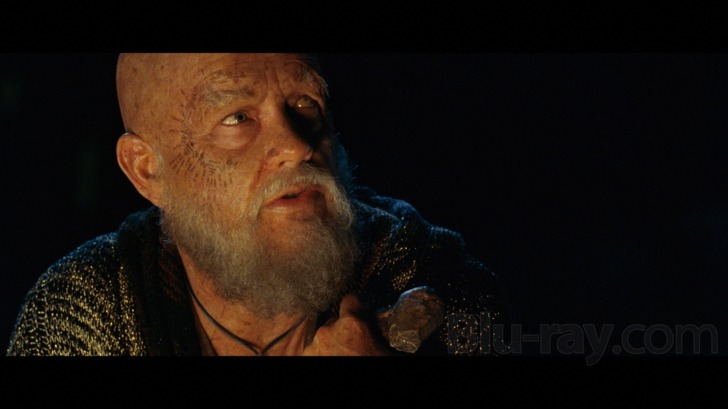
While my extensive experience as an editor has led me to a disdain for flashbacks and flash-forwards and all such tricksy gimmicks, I believe that if you, dear reader, can extend your patience for just a moment... you will find there is a method to this tale of madness.
At first glance, Cloud Atlas' six storylines are connected by little more than prosthetics and not-always-so-familiar faces, while following the endless array of characters that inhabit each time period requires, at the very least, a series of hurried, hand-scrawled flow charts. Delve deeper, though, and you'll find that Cloud Atlas' six storylines... erm... are connected by little more than prosthetics and not-always-so-familiar faces, while... let's see here... following the endless array of characters that inhabit each time period requires... hm... a series of hurried, hand-scrawled flow charts. It isn't often that a movie loses me. I miss my share of small details and nuances like everyone, but my second viewing of a film is almost always a purely enriching experience and rarely, if ever, remains a purely introductory experience. Even now, watching Tykwer and the Wachowskis' densely packed, intentionally abstruse world of lawless reincarnation and dizzying pretension again, I'm on the outside looking in. The film's third act naturally continues to be the film's most illuminating asset; serving as both cypher and key in every subsequent viewing. But as uncrackable cinematic codes go, I'm not sure Cloud Atlas will ever be fully cracked. If previous interviews with Tykwer and the Wachowskis are any indication, I'm not even sure the filmmakers could fully crack their own spiraling mosaic.
Make no mistake, though, it's not that the film can't be understood. It's far more accessible and singular in interpretation than the likes of Holy Motors. It's that it doesn't really want to be understood.
Imagine a cliff, towering and sheer. Picture it. See it in your mind's eye. Try as you might, you find your equipment to be useless, unable to pierce the rockface. You search for a branch, an anchor point, anything. You look higher, searching for a foothold. Nothing. You look still higher and finally, after straining your eyes, spot a small, inch-wide gap. Your heart sinks. The only foothold, the only anchor point is more than a hundred feet away. The first viewing of Cloud Atlas is a grueling search for that gap; one that only presents itself two hours into the three-hour film. The second viewing is a desperate search for another, this one closer but still dangerously distant. It's an exhilarating climb, I'll admit; a bold, lofty ascent toward comprehension that promises a rush of satisfaction with every concrete revelation. But it's also an exhausting exercise in patience, perseverance and focus. Whereas Mitchell's novel presented the six stories in measured progression followed by measured regression (1-2-3-4-5-6-5-4-3-2-1), the filmmakers hyper-leap from one time period to the next as often, suddenly and jarringly as they can stomach, without any concession, warning or, now and again, intuitive rhyme or reason. You're not in the filmmakers' car, you're being dragged behind it. The Wachowskis don't frequent the freeway either. The car hangs a sharp left, careens off-road and drags its "passengers" through a rocky, brambly forest. Doesn't sound very pleasant? For too long a time, it isn't.
Visually, Cloud Atlas tends to be the delirious, untamed stuff of confounding dreams and lucid nightmares, and the co-directors' style and tone vaults from one genre to the next as distinctly as Mitchell's novel. Here, though, cutting so rapidly between the various storylines and time periods, the film suffers from a telegraphed viscerality and manufactured unwieldiness the filmmakers are eager to exploit but have trouble controlling. The resulting aesthetic is as inconsistent as it is unforgettable, which poses something of a problem. That problem extends to the fractured screenplay itself -- which lurches between poetic narration, prim prose, streetwise slang, modern English, humorless future speak, and a quaint, post-apocalyptic dialect reminiscent of Jamaican Patois -- as well as the visual effects, which are a smidge hit or miss. For all of the gorgeous CG cityscapes, gunships and sci-fi trickery, Tykwer and the Wachowskis rely on some of the worst makeup and prosthetic applications in recent memory. Some are outstanding: Tom Hanks fares better than anyone (minus his turn as gangster Isaac Sachs), Ben Whishaw and Jim Broadbent's appearances are the most reliable, and Hugo Weaving has a few notable looks, chief among them devilish Georgie. Some are downright distracting: Halle Berry's 1930s socialite and 24th century grandmother, James D'Arcy, Jim Sturgess and Weaver's 22nd century Korean officials, and Susan Sarandon's ever-evolving nose pieces. And some are laughably bad: the stiff, wrinkly Halloween mask that is Hugh Grant's old man Cavendish, Doona Bae's 19th century newlywed and puffy '70s Mexican worker, and, most ridiculous and laughable of all, poor Hugo Weaving's overweight, gender-bent, falsettoed Nurse Noakes.
The performances rise and fall too. Hanks is the best of the best, with the most dramatic, intriguing and unpredictable performances. (His mothball-mouthed gangster is a ham-fisted exception, but his cartoon character of a thug-turned-author is redeemed by a darkly hilarious encounter with a critic.) Broadbent is strong and compelling, often to surprising ends. Sturgess is excellent, the result of his quiet but passionate resolve and raw but careful choices. Winshaw and D'Arcy follow suit, delivering the film's most subtle and serious collection of performances. And Grant is, far more often than not, a joy to watch, stealing entire scenes as everything from a nuclear power plant owner to a 24th century post-apocalypse cannibalistic warlord. Berry, though, delivers one minute (Luisa Rey) and flails the next (Jocasta Ayrs), emerging as even more of a distraction than her not-so-believable age and race-defying makeup and prosthetics. Weaving often flounders, impressing with only two of his six roles (assassin Bill Smoke and Zachry's demonic hallucination, Old Georgie) and hitting a career low as Nurse Noakes. Bae is brilliant as a 23rd century "fabricant" (who's freed, Matrix-style, from servitude and shown the world as it really is) but comes undone elsewhere. And Sarandon, Keith David and Zhou Xun are largely wasted, albeit by no fault of their own.
More disappointing than its inconsistencies? Its failure to deliver on your investment. Cloud Atlas is a film that hinges on grand ideas and profound revelations. Tykwer and the Wachowskis are actively, deliberately trying to blow your mind, and at all costs; even when it's to the detriment of the very fabric of the film. But Cloud Atlas isn't mind-blowing. Mind-blending perhaps, headache-inducing most certainly, but not mind-blowing. It doesn't invite you in and treat you to its depths and wonders as the novel does, it assaults the intellectual senses and declares itself king. More to the point, as explored on screen, its ideas aren't that grand. Only its execution. Commendable? Yes. Brave? No doubt. Profound? All told, not really. It deals in endless universal and esoteric commodities, sure. But it doesn't offer much in the way of a return. While Tykwer and the Wachowskis succeeded in making Mitchell's unfilmable book filmable, even functional, theirs is a failure of translation, not conceptualization. It's not style over substance, it's style in the guise of substance, and it confounds far more than it enlightens.
Cloud Atlas Blu-ray Movie, Video Quality 
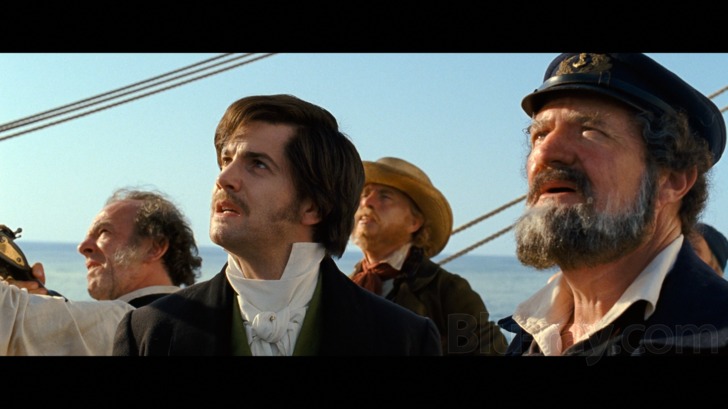
With nearly four hours of high definition content on a single disc, I was worried the film's video presentation might suffer, if only a bit. Thankfully, Warner's 1080p/AVC-encoded transfer doesn't show signs of having made any significant concessions. Colors are warm and beautifully saturated, with exceedingly lifelike skintones, pleasing earthtones, genteel primaries and rich, inky blacks. Contrast is consistent and well balanced too, delineation is quite good (barring some minor crush), and detail is excellent. Edges are crisp, clean and largely free of ringing (although ever-so-slight halos still appear from time to time). Fine textures are wonderfully resolved, without any smearing or errant softness to report. And grain is intact and unobtrusive, lending filmic legitimacy to what could have been an over-polished, glossy spectacle. Faint noise and negligible artifacts creep into the image on occasion, but they're a rarity most will overlook entirely. Otherwise, the presentation is free of serious macroblocking, banding, aliasing and the like, and clearly has plenty of room to breathe. Those who enjoy the film will only enjoy its transfer that much more, particularly on repeat viewings.
Cloud Atlas Blu-ray Movie, Audio Quality 
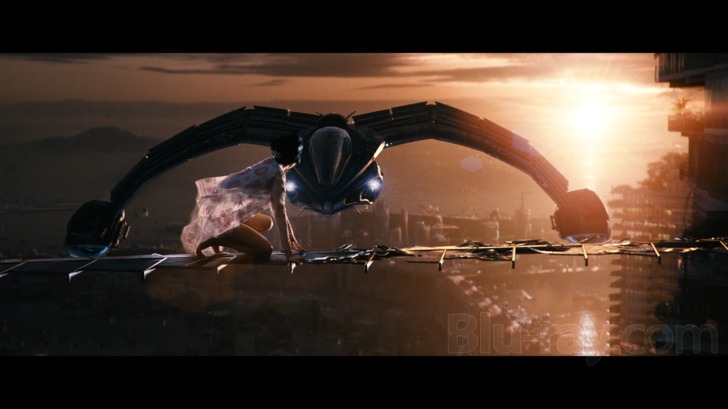
Though subdued on the whole, Warner's DTS-HD Master Audio 5.1 surround track delivers on its promises, capturing the subtlety of the film's quietest exchanges and the power of its most fearsome sequences. Cloud Atlas is, above all, an ensemble driven drama, and dialogue is prioritized accordingly, and perfectly at that. Voices and clear and intelligible, whispers aren't left by the wayside and frightened shouts pierce even the most chaotic post-apocalyptic soundscape. LFE output demonstrates its power time and time again too, be it by way of a ship battling against surging waves during a thunderstorm, a futuristic aircraft firing on fugitives or a tribe of cannibals on horseback riding down a pair of helpless villagers. Likewise, the rear speakers are effective and engaging, creating a restrained but rewarding soundfield that prizes realism over unnecessary aggression. Directional effects are convincing, pans are smooth and the experience is most enveloping. There are moments, however fleeting, when the film's score seems a bit too reserved. But it isn't a distraction, and certainly doesn't amount to anything I'd call an issue. Ultimately, Cloud Atlas isn't an actioner and Warner's lossless track doesn't offer an action-driven mix. It simply handles the intertwined thematic and sonic crescendo of the film with grace, precision and fortitude.
Cloud Atlas Blu-ray Movie, Special Features and Extras 
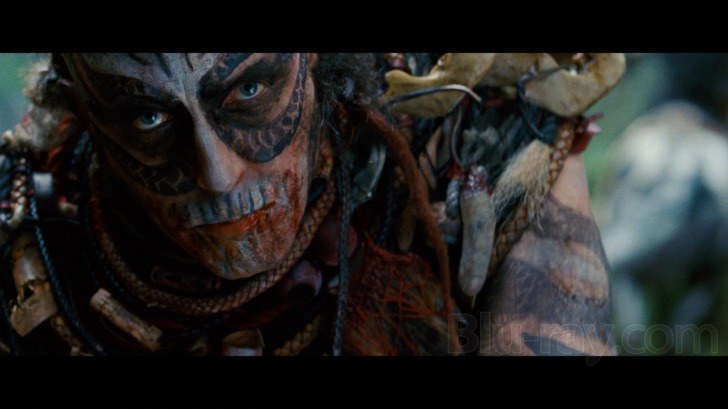
The Blu-ray edition of Cloud Atlas offers seven "Focus Point" featurettes (HD, 55 minutes), providing a decent but less-than-extensive overview of the film and production. There's quite a bit of repetition and overlap, sadly, but there's enough behind-the-scenes threads and tidbits to amount to a reasonably satisfying documentary. More forthcoming, fly-on-the-wall extras, a pair of cast and crew commentaries or a Maximum Movie Mode would have all been welcome and wonderful additions to the experience, though, as seven Focus Point featurettes don't amount to a very exciting supplemental package.
- A Film Like No Other (HD, 7 minutes): More of an extended promo, this talking heads EPK features key members of the cast and crew waxing poetic about the project, its significance, the logistic challenges faced, and its uniqueness among science fiction films.
- Everything is Connected (HD, 8 minutes): A look at the interlocking existences of the various characters and the manner in which the staggeringly different yet striking similar storylines overlap and impact one another.
- The Impossible Adaptation (HD, 9 minutes): "Impossible" is becoming less and less impressive as more and more "unfilmable" books are transformed into fully functional movies. Nevertheless, the difficulty of adapting author David Mitchell's novel is covered in short order.
- The Essence of Acting (HD, 7 minutes): The actors discuss their roles and the choices they made to both distinguish the new incarnation of each character while recalling elements and personality traits of the old.
- Spaceships, Slaves & Sextets (HD, 8 minutes): Six stories at once; a bold, unmistakably daunting approach to storytelling that posed an endless array of opportunities and pitfalls. The filmmakers and actors discuss the production's fractured plot.
- The Bold Science Fiction of Cloud Atlas (HD, 7 minutes): More talking heads and clips, this time focusing on the most distinctly "sci-fi" of the storylines and the evolution of language and culture as presented in the film.
- Eternal Recurrence: Love, Life and Longing in Cloud Atlas (HD, 8 minutes): Romance and fate over the ages, as interpreted by the cast and crew through the various stories.
Cloud Atlas Blu-ray Movie, Overall Score and Recommendation 
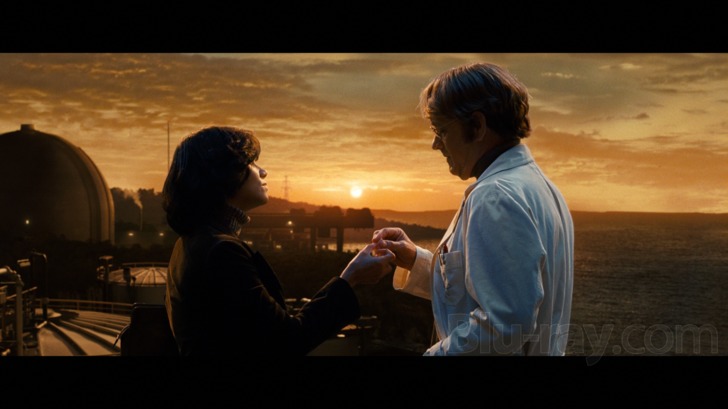
Our lives are not our own. From womb to tomb, we are bound to others, past and present.
Cloud Atlas is a must-see film, fatally flawed as it is. Love it or loathe it, it's an experience that demands exploration and discussion. It's also an experience that demands multiple viewings, and I'd suggest locking yourself into watching it at least two times, either before mistaking its ambition for brilliance or dismissing it outright. Fortunately, Warner's Blu-ray release makes it that much easier to return again and again, thanks to a terrific video presentation, a refined DTS-HD Master Audio 5.1 surround track and a solid (albeit short) hour-long glimpse behind the scenes. Enjoy it for all it is, hate it for all its not. Just be sure to give it a chance. Or two. Or three. Or...
Other editions
Cloud Atlas: Other Editions

Cloud Atlas
+ VUDU Offer
2012

Cloud Atlas
2012

Cloud Atlas 4K
Collector's Edition
2012

Cloud Atlas 4K
Collector's Edition + 2 Posters + Slipcover
2012
Similar titles
Similar titles you might also like

Voyagers
2021

Daleks' Invasion Earth: 2150 A.D.
1966

Riverworld
2010

The Man Who Fell to Earth
Limited Collector's Edition
1976

When Worlds Collide
1951

Space: 1999: The Complete Series
1975-1977

Blake's 7: The Collection - Series 2
1979

The Creator 4K
2023

The Expanse: The Complete Series
2015-2022

2001: A Space Odyssey 4K
1968

V: The Complete Second Season
2011

Galactica 1980: Full Frame
Definitive Edition
1980

The Day the Earth Stood Still
2008

The Man from Earth: Holocene
Limited Edition
2017

Rememory
2017

Escape From the Planet of the Apes
1971

THX 1138
The George Lucas Director's Cut
1971

Fire Maidens of Outer Space
Fire Maidens from Outer Space / Slipcover in Original Pressing
1956

Children of Men
2006

Fahrenheit 451
2018